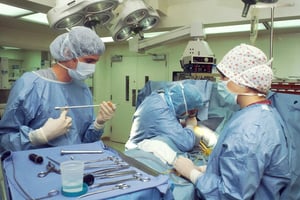As the healthcare industry continues to grow, so too does its impact on the environment. From single-use plastics to energy-intensive facilities, the healthcare sector is responsible for a significant portion of global carbon emissions. In fact, the NHS is responsible for around 4-5% of England’s carbon footprint. Global healthcare emissions account for approximately 4.4% of global net emissions, according to the World Health Organization.
As a result, it is crucial that the industry takes action to reduce its carbon footprint. One area where this is particularly important is in the use of low carbon alternatives in surgery. With an estimated 312 million surgeries taking place worldwide each year, it’s clear that reducing the emissions associated with surgical procedures could have a significant impact on the environment.
So, what are some low carbon alternatives that can be used in surgery?
Firstly, reusable surgical instruments can significantly reduce the amount of waste generated during surgical procedures. By using durable surgical instruments such as scalpels, containers and waste bins that can be sterilised and reused, hospitals can reduce the need for disposable instruments and thus lower their carbon footprint (when sterilised using renewable energy).

Secondly, the use of TIVA based anaesthetics in place of high carbon anaesthetic gases such as Desflurane, can have an enormously positive impact on the environment. Anaesthetic gases have a high emission factor, 10,000 times greater than intravenous anaesthetics. Intravenous anaesthetics where appropriate has the potential to dramatically reduce the carbon footprint of surgery.
We understand that the role of single-use plastics plays an important role within patient safety. However, there are a variety of scenarios where replacement with multi-use plastics or alternative materials is possible. The management of waste in healthcare settings could be one major route to reducing the carbon footprint, with the implementation of management policies (for example, recycling single use packaging) offers a promising route forward.
These are just a few examples of the low carbon alternatives that can be used in surgery. By adopting these and other sustainable practices, hospitals and healthcare providers can significantly reduce their environmental impact.
At Tunley Environmental, we are committed to helping the healthcare industry reduce its carbon footprint. Our recent white paper, “The Healthcare Industry: Plastics, Emissions, Surgery and Sustainability,” explores these issues in greater detail and offers practical recommendations for reducing the environmental impact of the healthcare sector.
If you’re interested in learning more about this important topic, we encourage you to download our white paper and join the conversation about sustainability in the healthcare industry. Together, we can make a difference and help create a more sustainable future for all.
WANT TO READ MORE?
We have released a full white paper on Sustainable Surgery Alternatives. Download below to read more.



